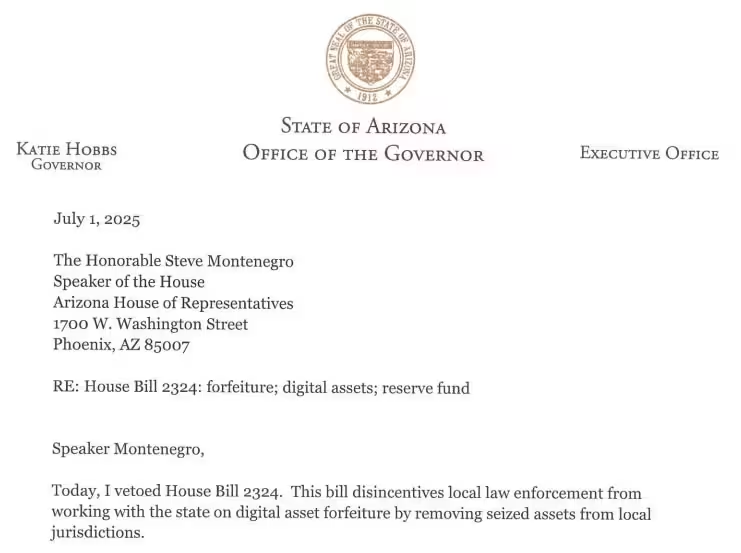4 Minutes
Arizona's Latest Setback in Crypto Reserve Initiatives
Katie Hobbs, the Governor of Arizona, has once again vetoed a bill aimed at establishing a state cryptocurrency reserve fund using seized digital assets. The proposed legislation, known as HB 2324, was designed to allocate proceeds from confiscated cryptocurrencies between law enforcement agencies and the state government. Despite support in the state legislature, Governor Hobbs halted the measure, citing concerns over local agency cooperation and asset control.
Details Behind the Vetoed Crypto Bill
HB 2324, recently approved by the Arizona House of Representatives with a 34-22 vote, would have allowed the state to hold confiscated cryptocurrencies, such as Bitcoin, in a dedicated fund called the "Bitcoin and Digital Assets Reserve Fund." However, Governor Hobbs vetoed the bill on Tuesday, explaining in her letter that the proposed law would have discouraged local law enforcement agencies from collaborating in digital asset seizures by stripping them of control over these assets.
The legislative journey for HB 2324 highlights ongoing debates within Arizona’s political landscape. Initially rejected by the House in May, the bill was subsequently revived by the state Senate, receiving final House approval in late June. Yet, with Governor Hobbs’s veto, the fate of the fund hangs in the balance; the legislature could theoretically override the decision with a two-thirds majority, but this scenario currently appears unlikely.
How the Fund Was Meant to Operate
According to the bill text, the first $300,000 in seized cryptocurrency per criminal case would have gone to the Attorney General’s Office. Any amount over that threshold would have been distributed as follows: 50% to the Attorney General, 25% to the state general fund, and 25% allocated to the new cryptocurrency reserve fund. This innovative approach was set to enhance Arizona’s financial toolkit while demonstrating a willingness to embrace blockchain technology and digital asset management at the state level.
Governor Hobbs’s Crypto Legislation Track Record
This is not the first time Governor Hobbs has exercised her veto power on crypto-related legislation. In May, she blocked Senate Bill 1025, which would have created the Arizona Strategic Bitcoin Fund, permitting the state treasury to invest up to 10% of its portfolio in Bitcoin. At the time, Hobbs cited the "unproven nature" of cryptocurrency investments as the reason for her decision.
Additionally, Hobbs vetoed Senate Bill 1373, which sought the establishment of a government-managed cryptocurrency treasury using seized digital assets. In total, Governor Hobbs has rejected three major crypto bills, approving only House Bill 2749. This bill amended state laws to recognize cryptocurrencies within the framework of unclaimed property and financial regulations and ultimately established the "Bitcoin and Digital Assets Reserve Fund" under state treasurer oversight.
Crypto Reserve Legislation Gains Momentum in Other States
Arizona’s struggles are echoed in other regions, as crypto reserve initiatives are introduced nationwide. In Texas, Governor Greg Abbott recently signed a bill launching the Texas Strategic BTC Reserve, which will see the state holding Bitcoin as part of its long-term assets. Similarly, New Hampshire passed a law in May allowing the state to invest in digital currencies and precious metals.
According to data from the Bitcoin Laws website, at least six other U.S. states are currently at different stages of considering or passing similar cryptocurrency reserve fund legislation. This trend reflects a growing recognition among state governments of the potential benefits offered by blockchain-based assets and decentralized finance for public sector portfolio diversification.
The Future of Blockchain Adoption in State Governments
As states like Arizona, Texas, and New Hampshire navigate the regulatory complexities of cryptocurrency assets, the broader crypto community is watching closely. Whether states succeed or face ongoing legislative roadblocks, these efforts highlight the mainstreaming of blockchain, digital currencies, and their integration into government finance. Arizona’s latest developments provide valuable insight into the evolving landscape of crypto regulations across America.

Source: mihanblockchain



Comments